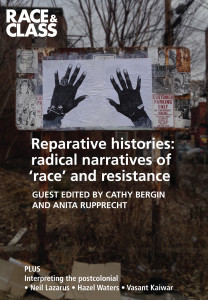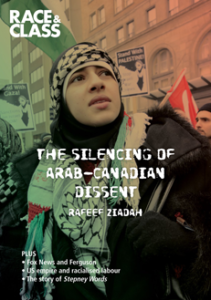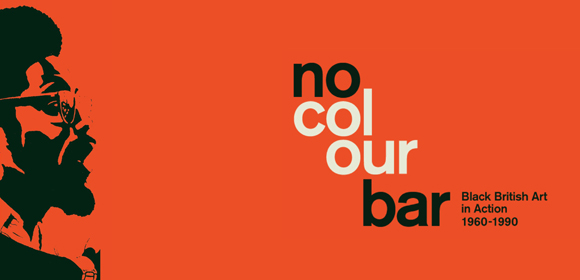Below we publish an excerpt of a commentary in the April 2017 issue of Race & Class, in which Colin Prescod (IRR Chair) examines the challenges of black heritage facing archivists today.

This is an edited version of a keynote speech to the annual conference of the Archives and Records Association 2016 in which a leading black British cultural curator, using the concept of ‘reparative histories’, charts his own involvement in and knowledge of recent milestones in black cultural heritage intervention in the UK. Referencing the London Mayor’s Commission on African and Asian Heritage, the museum world’s marking of the ‘2007 bi-centenary of the Act abolishing the Atlantic slave trade’ and the significant ‘No Colour Bar’ archive and art exhibition of 2015, he challenges archivists to understand the issue not as the need to simply ‘include’ Black experience, but to allow Black agency in the making of the record.
The ‘Global Futures’ title of your conference has led me to think about how futures are related to pasts and presents, and about the global in our local, and the local in our global. And this is my chosen focus: to privilege something of our local as it opens to global matters, theoretical and professional – and in all this to be concise.
In the hope that you will understand something beyond a blindingly obvious skin-colour reference, it may simplify things to say at the start that I’m going to take the approach of speaking to you out of ‘Blackness’. That is to say, I am voicing something of the Black experience in Britain across the twentieth and twenty-first centuries. To give some kind of intellectual context to my remarks, I want to reference the idea of ‘reparative history’, an umbrella concept that covers my personal intellectual endeavour as well as that of a number of other Black British activists, over many decades, and also bridges to a newish insurgent intervention in academic historiography.
 In the January–March 2016 special issue of the journal Race & Class, guest editors Cathy Bergin and Anita Rupprecht, both of the Humanities Department at the University of Brighton, describe the ‘reparative history’ academic project with which they are engaged as concerned with ‘the complex interconnections between past and present in the context of contemporary resistances to racism and the legacies of colonialism’.[1] Put more bluntly, their reparative history academic project might be said to be about reframing the radical histories of resistance to White supremacy, locally and globally.
In the January–March 2016 special issue of the journal Race & Class, guest editors Cathy Bergin and Anita Rupprecht, both of the Humanities Department at the University of Brighton, describe the ‘reparative history’ academic project with which they are engaged as concerned with ‘the complex interconnections between past and present in the context of contemporary resistances to racism and the legacies of colonialism’.[1] Put more bluntly, their reparative history academic project might be said to be about reframing the radical histories of resistance to White supremacy, locally and globally.
When the essays for this special issue of Race & Class first came to the Editorial Working Committee of the journal, I immediately saw what they were on to. I recognised, for instance, the relevance of their insistence on ‘rebellious rage’ as a force in history, which should be addressed as such by academic historians. It occurred to me that this ‘reparative history’ business was what I’d been engaged with for all of my professional life – earlier, back in what is now the last century, as an academic sociologist, and latterly as what, for today’s purposes, I will call a ‘cultural animator’.
To be clear, my engagement with what Cathy Bergin and Anita Rupprecht refer to as ‘reparative history’ has not been what you might call a ‘career choice’. It has been an endeavour not so much chosen, as thrust upon me, given that I’ve found myself living in a society in which racism is ingrained. To the extent that there is any truth to the old African aphorism/adage-cum-provocation ‘Until the lions have their historians, the story of the hunt will always glorify the hunters’, my endeavour and that of a community of grassroots heritage organisations that I want to bring to your attention, has been about the necessity of lions wresting the telling of their story away from the hunters.
In August 2016, the Guardian featured a piece referencing the case of the ‘Mau Mau’ rebellion, that is to say, the Kikuyu-Kenyan Land and Freedom Movement of the 1940s/50s, which occurred in an east African corner of the erstwhile British Empire.[2] I cite the piece here because it was concerned with historical records, and it implicated archivists at the very highest level in startling, even scandalous, duplicity. It made reference to the work of a Harvard University historian, Caroline Elkins, who had delved in the archives, including the UK National Archives, first for her own academic research, and later to support the claim of Kenyans who had survived Britain’s brutal suppression of their anti-colonial rebellion/uprising back in the 1950s. Some 1.5 million Kenyans were held in detention camps and confined in villages, where they were evidently, argues Caroline Elkins, subjected to systematic and often murderous violence. As most of you will know, a lawsuit brought by now elderly Kenyans was settled in 2012/13, when the British government admitted its historical ‘crimes’ and moved to settle with an unprecedented offer to compensate 5,288 Kenyans for torture and abuse.
There are academic historians who are still debating the professionalism of the historiography that Caroline Elkins brought to the ‘Mau Mau’ issue – some attacking, some supporting. Two things are of special interest to us here. The first is that at the centre of this story is Elkins’ discovery and exposure of a cover-up spanning some fifty years – a cover-up that involved not simply the British government’s destroying, hiding and denying the existence of a secret cache of records, vital to any full understanding of a history of the Empire. And, it was evidently doing this with the active assistance of unnamed but powerfully well-placed professional archivists. The second and even more interesting matter for us here, professionally, is a continuing and fraught discussion as to how these very newly uncovered archives at Hanslope Park in the south of England, which contain records – not unlike those on Kenya – concerning British government practices in the days when its empire spanned the globe, are to be interpreted.[3] To put the question bluntly: are these now exposed practices to be seen as systematic or accidental? Evidence here, then, of the global in our local; and much to debate about how the global past impacts on our local/global present, as well as on our local/global future.
I would argue that what Bergin and Rupprecht and Elkins bring to their academic historiography is an ‘activist sense of agency’, what others might well call ‘an agenda’. And this is where my stumbling practice around archives and records joins with their more disciplined academic practice. Of course, I realise that this having of an agenda may be disturbing to some, even many, academic historians, and, I dare say, disturbing perhaps to some, even many, professional archivists. The argument is not so much about facts as about interpretation.
***
It must be pretty clear to you by now that I engage with our dominant historical narratives as a rebel, as one always controlling my rage in the process of making sense of how and why my experience is marginalised and excluded. Here lies my central theme. I come to archives and records as a part of a project of contesting the dominant historical narratives that marginalise and exclude. And the frame for my remarks today is the story of my engagement with archives, and heritage, and history – my journey, personal, professional and political; from the margins to the mainstream and from the mainstream to the margins. To the extent that this strategy for a keynote risks my appearing to be merely anecdotal and self-aggrandising, bear with me, for my intention is to contribute to your conference discourses. A more modest and less sensationalist title for my keynote might be ‘Archives, history and heritage: Black British stations of the cross’. I want, then, to talk with you about Black British history.
We, Black folks, have a long history of twentieth-century insistence that Blackness belongs in and to any full history of what made Britain ‘Great’ (again, the global in our local). This insistence stands in the face of the notoriously ill-informed racist British National Party chant of the late twentieth-century ‘There ain’t no Black in the Union, Jack’. Get the pun?
We, Black folks, have a history that features resistance and rebellion, as well as, protest and participation. It is a history stretching from predicaments which include forced transportation across the Atlantic in our tens of millions; through oppression, exploitation, cruel brutalities and murderous violence in plantation-slavery and indenture, then colonial-imperialism; and continuing now into neocolonial ‘independence’ within a global imperialist system.
We, Black folks, have a history that brings us in recent times to the ‘mother country’, Britain, in significant numbers, as migrant-settlers, post-second world war. You will know that this settlement has not been unproblematic. And this brings me to the first notable stop, or station of the cross, on my journey (along with others) of engagement with archives and heritage: ‘The Mayor’s Commission on African and Asian Heritage (MCAAH) of 2003/4’, and its report Delivering Shared Heritage.[4]
 The commissioning mayor was Ken Livingstone whose ‘radical’ mayorship of London in the early part of this century reminded everyone that the state, local and national, is meant to be a state for all people in all classes, not just the tool of the current ruling or governing class. Accordingly, his mayor’s agenda included the setting up of the MCAAH, on which I served as a very active Vice-Chair. The active participants listed in the ‘hearings’ of the Commission included directors and senior staff from a number of the major heritage organisations (British Museum, National Portrait Gallery, English Heritage, National Gallery, National History Museum, Museum of London, Royal Geographical Society, London Libraries Development Agency, National Maritime Museum) as well as government ministries.
The commissioning mayor was Ken Livingstone whose ‘radical’ mayorship of London in the early part of this century reminded everyone that the state, local and national, is meant to be a state for all people in all classes, not just the tool of the current ruling or governing class. Accordingly, his mayor’s agenda included the setting up of the MCAAH, on which I served as a very active Vice-Chair. The active participants listed in the ‘hearings’ of the Commission included directors and senior staff from a number of the major heritage organisations (British Museum, National Portrait Gallery, English Heritage, National Gallery, National History Museum, Museum of London, Royal Geographical Society, London Libraries Development Agency, National Maritime Museum) as well as government ministries.
The MCAAH completed its Delivering Shared Heritage report in 2005. Central to its recommendations in regard to what it called ‘empowering community-based heritage’ was an insistence that there should be mainstream recognition and integration of the contribution of British Black (African and Asian) communities to the life, culture and history of London, and therefore to the nation.
The Commission took evidence and deliberated over a period of some months. The several, twenty-five-plus, community-based and largely volunteer-resourced heritage organisations that made presentations to the Commission clamoured for much greater support, not least for dedicated funding to support capacity building and especially training in core heritage skills.
And what I wish to emphasise about the MCAAH moment, so to speak, is that, quite apart from the firm follow-through commitments obtained by the Commission from all of the participating mainstream institutions, the participation of the Black community-based heritage organisations, fuelled, in itself, a confident surge of Black archives interventions beyond that point. This surge is a big part of the story that I am bringing to your attention.
You can download the rest of this article for free for a limited time only.
Related links
Buy the April 2017 issue of Race & Class here

